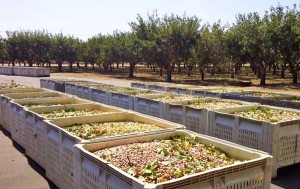A Salmonella outbreak followed by an investigation resulted in this warning letter from the U.S. Food and Drug Administration to ARO Pistachios, Inc. in California.
On May 21-May 24th, 2013, investigators from the Unites States Food and Drug Administration (FDA) conducted an inspection of your pistachio processing facility located at 19570 Avenue 88, Terra Bella, California 93270.
During the inspection, FDA found that your facility has serious violations of the Current Good Manufacturing Practice (CGMP) regulations for foods, Title 21, Code of Federal Regulations, Part 110 (21 CFR 110). These violations render your pistachio products  adulterated within the meaning of section 402(a)(4) of the Federal Food, Drug, and Cosmetic Act (the FFD&C Act), 21 U.S.C. § 342(a)(4), in that they have been prepared, packed, or held under insanitary conditions whereby they may have become contaminated with filth, or whereby they may have been rendered injurious to health. Our investigators’ observations were noted on Form FDA-483, Inspectional Observations, which our investigators issued to you at the conclusion of the inspection.
adulterated within the meaning of section 402(a)(4) of the Federal Food, Drug, and Cosmetic Act (the FFD&C Act), 21 U.S.C. § 342(a)(4), in that they have been prepared, packed, or held under insanitary conditions whereby they may have become contaminated with filth, or whereby they may have been rendered injurious to health. Our investigators’ observations were noted on Form FDA-483, Inspectional Observations, which our investigators issued to you at the conclusion of the inspection.
In early 2013 (prior to this inspection), your firm was associated with three Reportable Food Registry (RFR) reports that detailed positive Salmonella findings detected in two shipments of raw pistachios distributed by your firm. During the inspection, environmental samples were collected from various locations within your processing facility and analyzed. The analysis revealed the presence of Salmonella enterica serotype Senftenberg (S. senftenberg) in seventeen (17) subsamples. Specifically, Pulsed Field Gel Electrophoresis (PFGE) testing determined that a single PFGE pattern of S. senftenberg was present in your facility and that the pattern was present in multiple locations within your facility. The recovery of the same S. senftenberg serotype from multiple locations within your facility is a significant concern because it indicates that the pathogen is a potential resident organism in your facility. Further, finding Salmonella very near to where food is exposed, including numerous product contact surfaces, indicates a high risk of product contamination.
In addition, a cluster of salmonellosis infections reported from January through May 2013, were investigated by local, state, and federal public health and regulatory agencies. Epidemiological data from the outbreak investigation coupled with results of FDA inspection findings outlined below, and analyses from product and environmental samples collected from your processing facility indicate that pistachios were the likely source of the Salmonella outbreak. Therefore, we believe that your pistachios were also adulterated within the meaning of Section 402(a)(1) of the FFD&C Act because they contained the pathogenic bacteria Salmonella, a poisonous or deleterious substance that may render a product injurious to health.
FDA found:
a. An employee in your roasting room was observed repeatedly touching the bottom of shipping boxes that were resting on the floor and then touching roasted, ready-to-eat, pistachios without washing or sanitizing hands.
b. Maintenance personnel were observed entering and exiting the hand sorting room through a door that opens directly to the outside of the facility. Apparent bird droppings were observed on the floor of the outside areas where maintenance personnel were observed working and entering the hand sorting room. Inside the hand sorting room, two buckets containing floor sweepings of pistachios, dust, and debris, were observed near the hand sorting production lines. During the inspection, you stated that the buckets of floor swept pistachios will be reworked into finished product. The movement of employees from the outside of the facility (where apparent bird droppings were observed) into the hand sorting room may introduce contaminants into your facility and contaminate finished food, particularly based on your practice of reworking pistachios from the floor.
